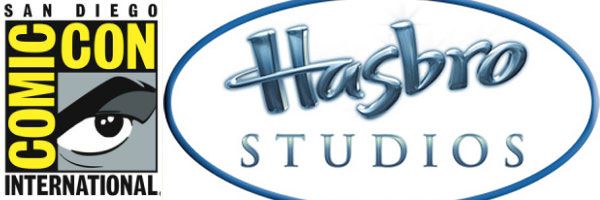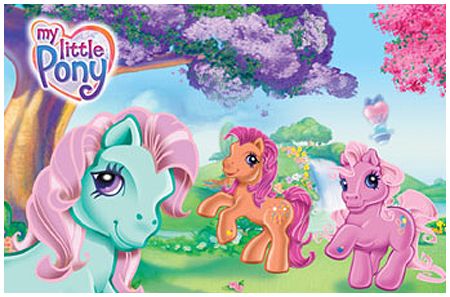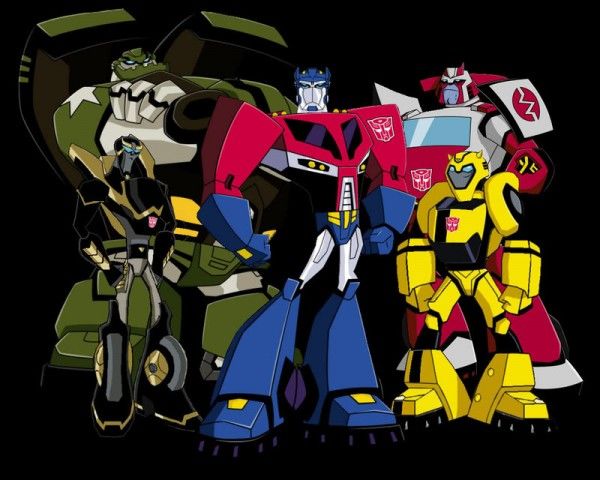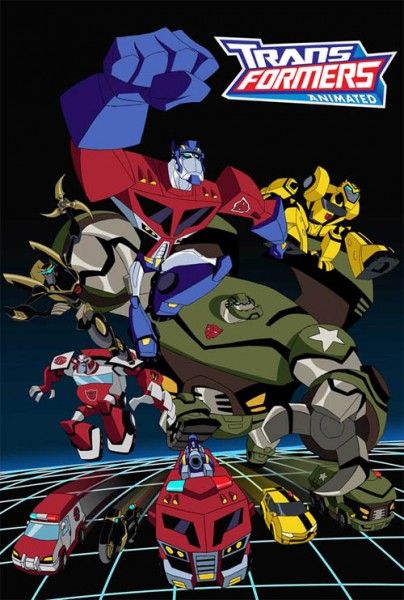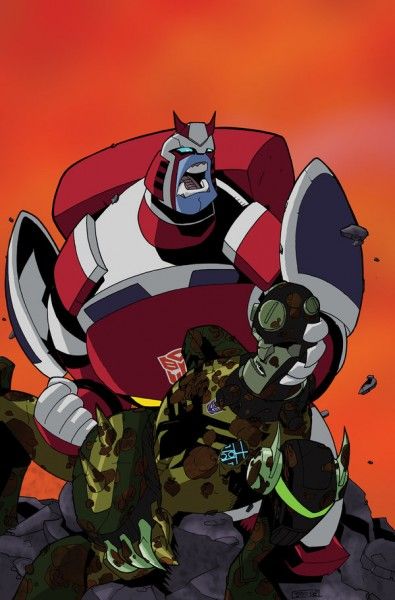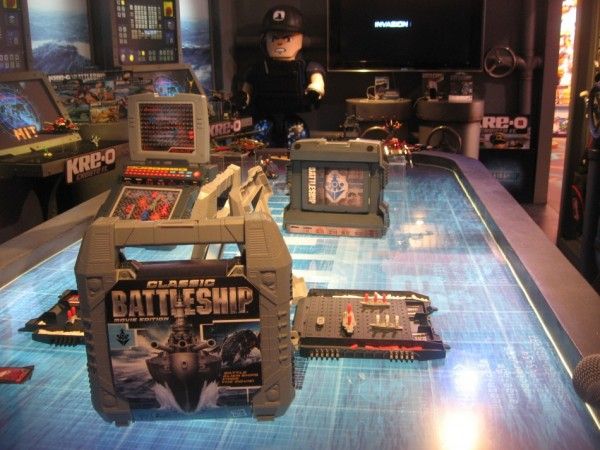Recently I got to sit down with Hasbros Studios president Stephen Davis at Comic-Con to discuss the future of Hasbro’s various television and film projects. Though many are quick to deride the current trend of turning action figures, board games and other non-narrative cultural detritus into blockbuster cinema, I don’t see why it’s inherently bad. A talented filmmaker could absolutely make a cool Oujia movie or anthology series, Candyland could be a phenomenal bit of sugarcoated existentialism, and some of Hasbro’s previous and current film and television endeavors, including Beast Wars and My Little Pony: Friendship is Magic, are actually very good.
With this in mind, I sat down to talk with Stephen Davis, head of Hasbro Studios. During our one-on-one interview, we discussed the Brony movement, the various incarnations of Transformers, Stretch Armstrong, making programming for older audiences, the future of Battleship, the importance of a great theme song and more. Hit the jump for the full interview.
Collider: Great actually. I just got to interview one of my favorite rock stars, Andrew W.K.
Davis: Oh my God, fantastic!
He’s playing a show here and he’s also doing a speaking engagement at the My Little Pony, Brony Con in September.
Davis: That is so funny, I didn’t know that.
Are you guys involved with that?
Davis: The Brony movement is really an organic movement that was created by the fans. Frankly one of the reasons I think it’s as successful as it is, is because it’s independent. And I don’t know if you were at the My Little Pony panel this morning…
I couldn’t. I had another panel I had to cover. Was it all Brony questions?
Davis: It wasn’t all Brony questions, but I’d say it was probably an equal number of Bronies and Friendship is Magic fans.
I think the Bronies are fans. I mean, I’ve watched that show, and it is so much better written and animated than it has to be or needs to be to serve its’ function.
Davis: I take that as a compliment.
And I don’t mean it as a backhanded compliment either! Because there are certain things that, like, Beast Wars was one that I watched as a kid and that had really complicated plots. It was really cool. But what do you make of Bronies? Where do you think that comes from?
Davis: You know, it’s interesting. I think that the writers, Meagan McCarthy and the writing team have done such a tremendous job of creating a world that is so broadly appealing. And it isn’t just a show for little girls anymore, which it was in the ‘80s. And I think that it starts with tremendous storytelling and characters that kind of resonate cross-gender and cross-demographic. And I have to tell you, I never saw it coming. I don’t think anyone at Hasbro predicted that we would see the creation of such a unique and significant movement as the Bronies.
Other than [the Bronies], who are the most passionate fans that you’ve seen?
Davis: By the way, ‘cross-gender,’ you know what I mean...
[Laughter]
Well, you didn’t say, ‘Intergender.’ But I suppose transvestites* might enjoy…
Davis: They do! It’s male, female and everything in between.
[Laughter]
So, other than the Bronies who are the most passionate fans? Who is asking you for scoops or spoilers?
Davis: Well, our Transformers fanbase is very, very passionate and so steeped in the lore of Transformers. And there are so many people who are virtual walking encyclopedias when it comes to the whole history of Transformers. And, you know, it’s a very, very broad demographic. We have equally rabid fans from eighteen-to-forty-nine as we do from boys six-to-eleven. I think you walk around Comic-Con you use a certain barometer of how individuals dress up; what their costumes are. For me, last year…kind of Transformers, or all of our brands. You know, our owned brands, not like Star Wars or Marvel, who we have a relationship with – but with respect to the Hasbro brands – it was kind of Transformers predominantly. This year I’ve seen a lot more Pony. A. Lot. More. Pony. I’ve seen a little bit of Littlest Pet Shop, which is a new show we have for the fall, which kind of surprised me a little bit. But probably an equal number of Transformers fans. Our Wizards of the Coast brands: Magic the Gathering, Dungeons & Dragons, we have a new show called Kaijudo: Rise of the Duel Masters. We’ve seen a bit of a significant fanbase there. Also a great lore across a lot of our Wizards of the Coast brands. So again, folks who are really steeped in the mythology and really relate to it. You know, we have fifteen hundred brands. Most of them, in some form or format, generations grew up with. So, you expect that kind of loyalty and excitement around the brands when you have that kind of portfolio.
With something like Transformers, when you’ve had series from Generation 1, which was the original, and Generation 2, which had CGI transformations added in and then Beast Wars and Beast Machines, all that stuff up through now. Obviously the films are some of the most successful of all time and there is talk of shooting parts four and five back-to-back…how do you keep a canon between them? Do you see how the movie does and then base the TV show on that?
Davis: We really…with Transformers specifically, we really look at the movies as a stand alone storytelling vehicle from television. So, television to some extent kind of fills the gap between movies. But, Transformers Prime is unique. The stories don’t relate at all to the three Transformers movies that have been released, nor will they relate to any future Transformers movies because part of our opportunity and frankly our responsibility is to provide a variety of entertainment experiences to consumers. And we want entertainment experiences to live in multiple forms and formats. Wherever kids and families are consuming entertainment, we want to be there. So, television gives us that opportunity that in some ways the movies don’t. We can go deeper into the story, we can create lots more characters over a longer sustained period of time. So the opportunity to be unique is such a tremendous one that we don’t feel the need to connect the two together. That doesn’t mean that at some point the television series might not spawn a movie. I think that’s probably very possible.
Do you have any of those in development that you can talk about?
Davis: Well, I can’t tell you what they are.
Can you tell me, you have fifteen hundred, can you tell me 1497 that aren’t?
[Laughter]
Davis: That would be giving it away.
I don’t think our interview is that long anyway.
Davis: One thing I can say is, although television is certainly not spawning a movie in this instance is that we announced that we’re going to be doing Stretch Armstrong and Stretch is a perfect example of a Hasbro brand that can live in television and movies side-by-side. And clearly, there’s opportunities to provide great storytelling. Again, stand alone storytelling. The movie doesn’t have to connect to the series necessarily, but you could see something like Stretch having a very long life.
Ha!
Davis: So to speak… And certainly I think our television series could spawn lots of other kind of entertainment opportunities across a lot of different platforms.
With that in mind, one of the other things you guys have in development is a film version of Ouija. Is there space to make things that are more for children and more for adults? Or is it all more for families and children? Do you have any plans for something that might be aimed more for seventeen and older groups?
Davis: It’s a really good question because clearly we have a number of brands that are appropriate for an older demographic and a movie like Ouija, and if we were ever to do a television series based on it, is one that could potentially be geared towards an older demographic. One could say the same thing, for instance, about Dungeons & Dragons or Magic the Gathering, even though in the trading card core the demo is a bit younger. But, more towards a sort of teen audience. But you could easily see any number of our brands, particularly some of our game brands being more geared towards an older demo. I think the threshold for us is that we’re not likely to do any R-rated movies. We’re very comfortable in the PG-to-PG13 space. So that’s going to drive, to some extent, where we would take our brands and what demo we would be focused on.
Because, I could actually see a pretty great Twilight Zone style anthology series based around Oujia.
Davis: Sure, absolutely.
Especially when you have a number of things…I mean, there is indeed a deep storyline to Transformers and I was a big fan as a kid. I could tell you about Transformers series that never existed like Transtech. I really wish that did exist. But, how does the format develop for itself when you have something like My Little Pony. Do you sit down and look at it and think about, how do we develop this backwards? Or do you have someone come in and pitch you stories and then you design toys from them?
Davis: Look, we first and foremost start with what our brand priorities are and we do a lot of internal development. But we work with a lot of outside creatives and we work pretty collaboratively. We don’t have a tendency to take a lot of outside pitches. We have a tendency to work with a number of the same folks. We tend to like to work with people who are of like mind and kindred spirits. And, you know, what I would say is, we’re sort of open to all opportunities and we’re somewhat demo agnostic. But you have to remember; we’re a family driven company and we always have been for ninety years. So, that’s going to draw into a lot of our decision-making.
How much R&D is there? Do you send somebody out and say, ‘Well, we own Jenga. Should we see if we can make a movie out of Jenga?’
Davis: We do a lot of development. We probably have fifteen-to-twenty projects in development right now. That may not seem like a lot for what would be a comparable studio, but there is very little that we put in development that we don’t make. So, we’re never going to have hundreds of things in development. We’re very choiceful about that. But to crack it, it takes time. So we’ve always got our farm team going on and we’ll bring them to the big leagues when we feel like we got it right. And you don’t always get it right, so you kind of have to have fifteen or twenty projects in active development and have deep bench strength.
As a kid, I know that there were a lot of shows I watched specifically because I loved the opening credits. How important is the theme song?
Davis: Huge! Huuuge! You know, that’s a really great question and nobody has ever asked me that before. I am a huge, huge believer that in the first thirty seconds of a show you can either grab the attention of a kid or you can turn them away. So the main title opening, the animation – or if it’s live action, how you treat the main title in live action – the music are so important. And if you watch our shows you will see that the music that we have is, I like to say, downloadable and danceable. It’s really catchy. It’s something that really catches your attention. We try to be really creative with our main title animations.
Where do you get the musicians?
Davis: We like to break new talent. Typically, we don’t license music we create it ourselves. We have a number of composers that we’ve worked with over the years. You know, Brian Tyler, who we’ve worked with on Transformers, who is very well known. We try to create a very distinctive style for each of our shows. You know, I love anthems, so I have a tendency to lean into big, fat, anthemy scores and themes for our shows. But we like to break new talent, and they’re there, you just might not know their names – other than a guy like Tyler, obviously – but we like that. It gives us a lot of flexibility.
Earlier this summer, you had Battleship come out and you did pretty well internationally, but you had a little bit of…troubled waters domestically, no pun intended. Do you have, is there any chance we might see a tv series of that? Because while I was watching it, I was thinking what a great cartoon it would be.
Davis: Look, we love Battleship, we think it’s a tremendous brand. There is no question but that I believe that a Battleship series could do very well both domestically and internationally and it definitely remains a high priority for us.
Are there any specific plans for it that you can talk?
Davis: Not right now.
*I know, not the same thing. I misspoke.
Catch up on all of our continuing Comic-Con coverage here.

